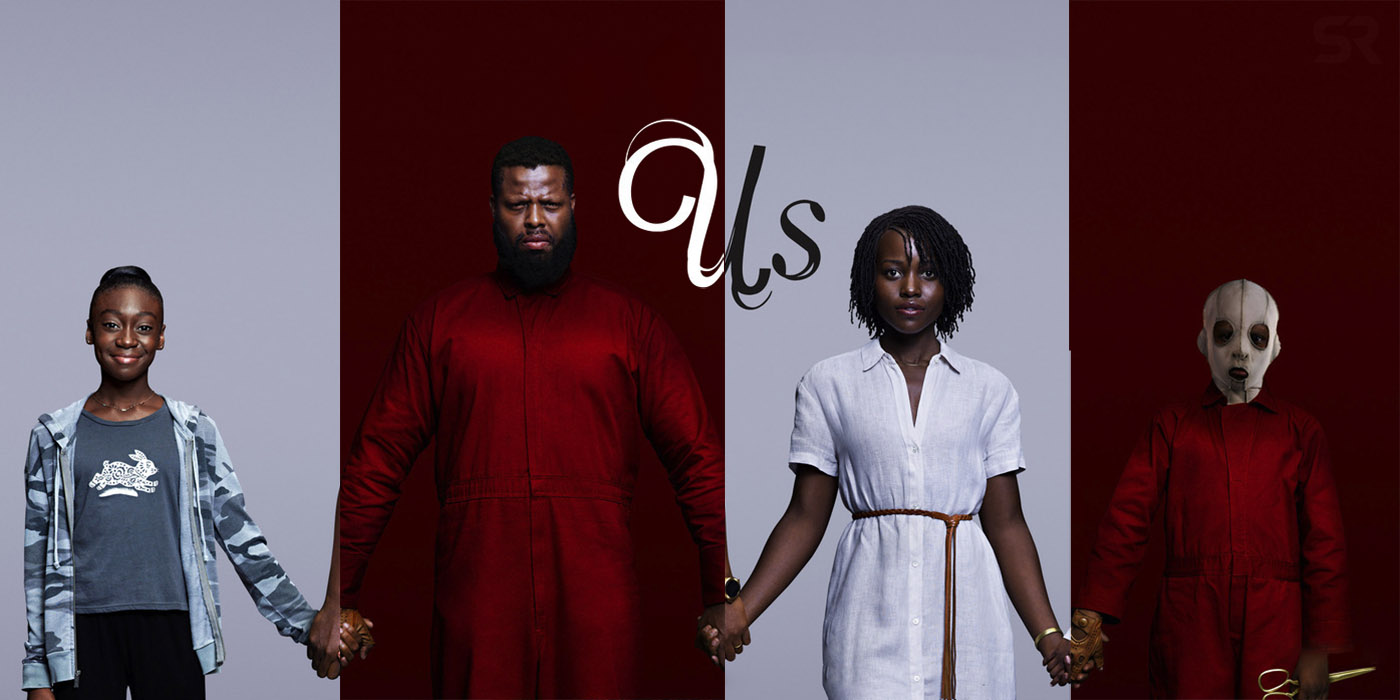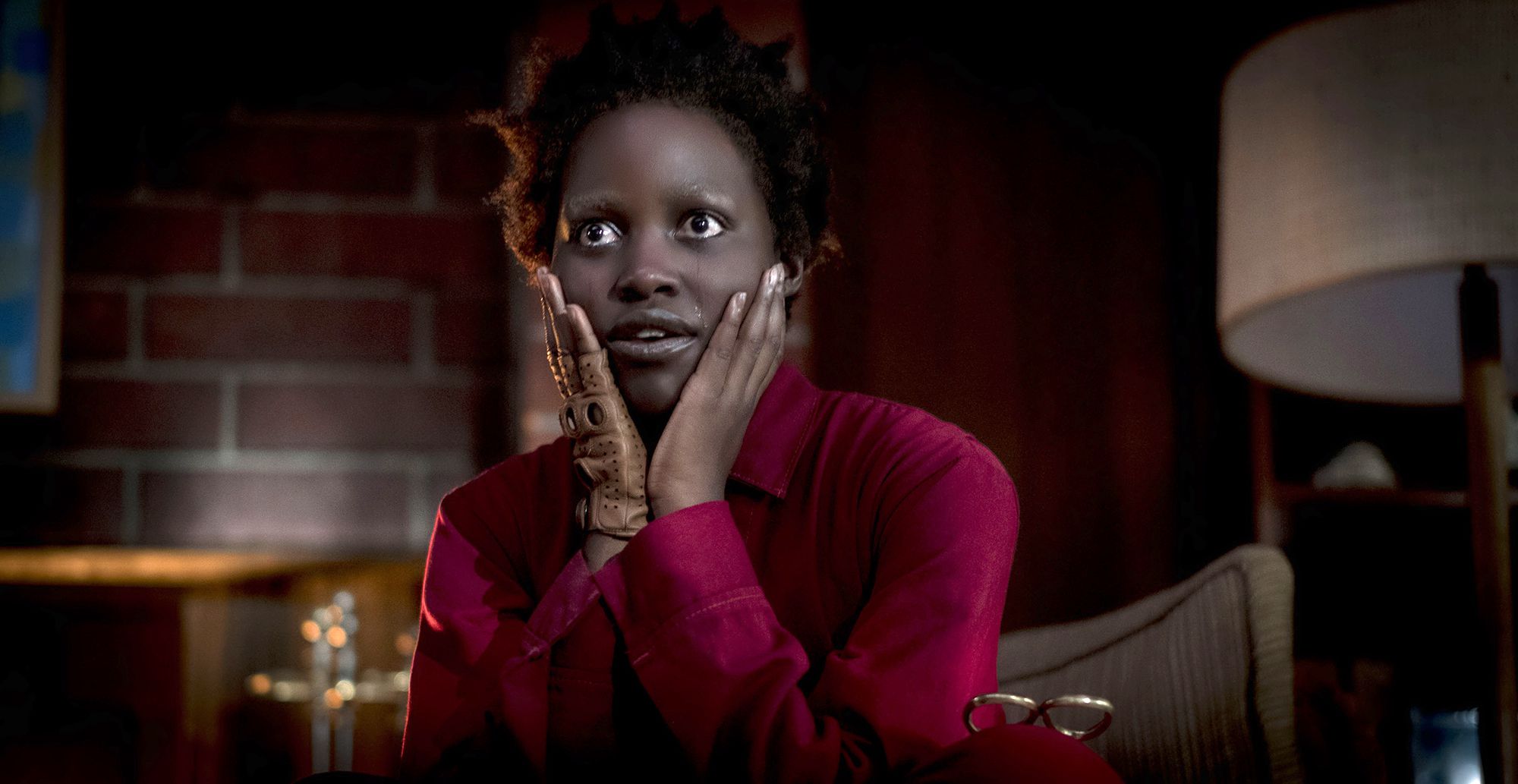
The ending of “Us,” Jordan Peele’s second feature film, dramatically alters the meaning, both literally and figuratively, of everything that came before it. All the themes, conflicts, expositions, etc. must now be viewed in a new lens. Peele ends “Us,” in other words, with an ambitious curveball. Unfortunately, said curveball is nearly the film’s undoing. Peele fails to balance thematic ambiguity with the social commentary that he’s clearly striving for. It’s a movie that could be about class in America, the nature of the soul, religious prophecies coming to light, and more. It could also be about none of those things; the ending doesn’t clarify the film’s themes so much as it does expand and, unintentionally, obfuscate them.
But I’m getting ahead of myself. For much of its runtime, “Us” is an outstanding film, one of the best horror films in recent memory. The performances are terrific from top to bottom, with Lupita Nyong’o’s dual performance being a particular standout. Peele’s direction is pitch-perfect, with a striking attention to detail and a masterful grasp of horror tropes. Its narrative, despite its clumsy conclusion, proves to be intriguing and engaging throughout.
The film begins in 1986, with a young girl and her parents at a beachside boardwalk. The girl wanders off from her parents and into a hall of mirrors. She is eventually greeted not by her reflection, but by an exact clone of herself. She’s forever traumatized by this moment, no longer able to even speak. Years later in the present day, the young girl, named Adelaide Wilson (Nyong’o), is now a mother of two, enjoying summer vacation with her husband Gabe (Winston Duke) and their two children (Shahadi Wright Joseph and Evan Alex). The pair return to the beach where Adelaide was once traumatized, meeting up with their friends (Elisabeth Moss and Tim Heidecker) and their two twin daughters (Cali Sheldon and Noelle Sheldon). A series of strange coincidences leads Adelaide to believe that her double, the person whom she saw as a young girl, may be coming back to haunt her. She’s right, in a way: A family that looks exactly like the Wilsons appears and forces their way into the Wilsons’ house. The doppelgängers, dressed in red jumpsuits and carrying gold scissors in a hand embellished by a leather glove, have something planned for the Wilsons.

It goes without saying that the doppelgänger family is played by the same actors as the main family, a choice that could backfire without a cast ready to rise to the challenge. Thankfully, Peele has assembled a remarkably talented collection of actors. Nyong’o is the obvious standout. As Adelaide, she smartly portrays a woman facing startling trauma, a determined and compassionate mother, and an all-around tough fighter. But her performance really shines as Red, her terrifying doppelgänger. Adopting a coarse voice with unnerving vocal tics, Red is a horrifying force of nature; the scariest moment of the film comes not from any of the deaths or dreadful suspense built up before them, but from a scene in which Red explains her traumatic backstory. The rest of the cast does great work, too: Duke is wonderful at home as the goofy dad of the family, Moss and Heidecker are terrific comedic relief, and even the child actors rise to the occasion of their emotionally complicated roles.
It helped, presumably, for the cast to have a master director like Peele behind the camera. With “Get Out,” Peele showed the world that he has an eye for horror and an ability to craft startling, unsettling imagery. With “Us,” he demonstrates that “Get Out” wasn’t lightning in a bottle. His every shot feels deliberate and thoughtful, with impeccable attention to detail. Eerie sound effects and music choices permeate the film, turning classic songs into foreboding or darkly ironic warnings of the chaos to come. But more than his ability to expertly build tension, Peele demonstrates a remarkable knowledge and understanding of the history of horror films. He pulls inspiration from films as different and historically distanced as Alfred Hitchcock’s “The Birds” and Wes Craven’s “A Nightmare on Elm Street.” He not only understands how auteurs like these construct a scene, create a villain, etc., but deploys these same techniques himself. In other words, Peele demonstrates that he is, perhaps, the next great filmmaker of the horror genre.
If only his writing could live up to his direction. For the most part, his screenplay is both innovative and traditional. It takes an original, compelling premise and melds it with the tropes of home invasion thrillers. It finds creative, and appropriate, ways to inject humor into otherwise unsettling moments.
But it almost completely falls apart in the film’s third act. Once the truth of the doppelgängers is unveiled, the film runs into a number of issues. On a literal level, the premise is suddenly full of plot holes and logistical impossibilities. These could be forgiven, as Peele wants us to overlook these issues in favor of thematic meaning. If only the film had something coherent to say. Unlike “Get Out,” which had a clear, powerful message behind it, the message of “Us,” is both open-ended and grounded in a social critique. It’s a film that is riddled with multiple meanings and interpretations and is clearly centered on a polemical take on the sins of the America (it’s not a coincidence that “Us” is also the initials for United States). But Peele’s desire for an open-ended message is at odds with his desire to make a point. The film is therefore both too ambiguous and not ambiguous enough; neither a polemic nor a film for the audience to interpret for themselves.
It is strange to conclude that “Us” is “merely great,” but that’s the only proper way to describe it. The film is staggeringly close to being a masterpiece; for much of its runtime, it’s practically perfection. But Peele veers way off the rails in his grand finale and, in the process, diminishes the greatness of the film that came before it. Yet, the performances and pitch-perfect direction mean that not even a disastrous climax can destroy “Us.” More than a great movie, it’s a sign that Peele is destined to join the ranks of the horror auteurs who so clearly inspired him.
Henry Spiro can be reached at hspiro@wesleyan.edu and on Twitter @JudgeyMcJudge1.


Leave a Reply